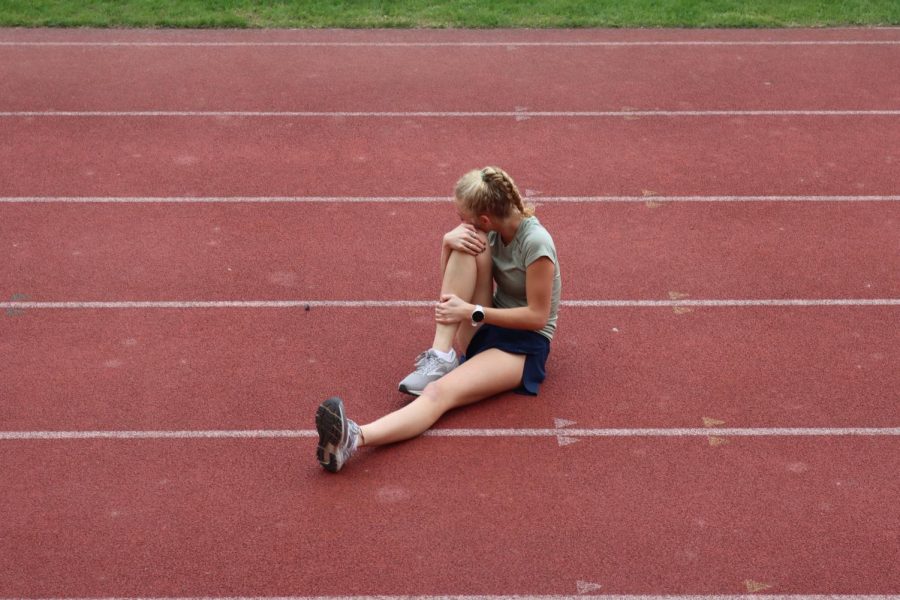The mental side of sports: Athletes develop ways to maintain a positive mindset
Junior Alexa Christensen rests on the track after a long and tiring day of classes and sports practice.
When gymnast Simone Biles withdrew from the team final competition during the 2020 Tokyo Olympics, she was met with mixed reactions from the public. Many criticized Biles for her withdrawal, but she has stood by her decision to prioritize her mental health. Since then, Biles has advocated for the importance of mental health among athletes. In an interview with NBC, she said that athletes must “put [their] mental health first” in order to enjoy their sports and succeed in competition.
Biles’ mental health struggles as a professional athlete are often reflected in student-athletes, who face similar pressure, anxiety and nerves.
Freshman Remy Phan, who has played competitive tennis for seven years, learned the hard way that mental health should always be a priority after experiencing a period of elongated frustration with her performance in her sport.
“I would beat myself up about playing bad for one day,” Phan said. “I would just get so mad; sometimes I would even cry. I think I just needed a break.”
As student-athletes devote increasing amounts of time to their respective sports, they feel significantly more pressure to perform well.
“Once you’re at a higher level, all you really focus on is winning,” Phan said. “I know coaches tell you it’s not all about winning, but that’s definitely not what it feels like for us.”
Junior Sonia Zhang, a softball player, sometimes feels as though her personal identity is completely consumed by her identity as an athlete.
“It’s really hard for me not to connect my self-worth to my performance in my sport,” Zhang said. “Most people know me as ‘Sonia who plays softball,’ so I had to learn that softball is not entirely who I am. There’s so much more to me than that.”
Because competitions can be major sources of stress, many athletes have developed ways to cope with their nerves before competing. Zhang talks to herself and takes deep breaths before and during softball games to overcome her anxiety.
“I remind myself to be mentally calm but physically aggressive,” she said. “It’s helped me a lot.”
Like Zhang, many student-athletes have found methods to perform well during competition. Sophomore Alex Miao relaxes himself before important swim meets by listening to calming music. During her golf tournaments, sophomore Kenna Lee imagines that she is playing a practice round rather than a tournament round to reduce her stress.
“I know that I get stressed out easily from golf and other things,” Lee said, “so I have just learned how to deal with it and calm myself down whenever I get too stressed.”
Many student-athletes also struggle with their mental health while trying to maintain the balance between their sleep schedules, social lives, academics and sports.
“I’ve heard from college athletes that it’s really hard to balance school, sports and your social life,” Zhang said. “They say that you can really only do two out of three.”
Sophomore Kristina Johnson has been playing field hockey for more than seven years. She practices for around 10 hours a week during off-season and considers it her main priority but often feels that other aspects of her life are limited by her commitment to field hockey.
“I almost feel like I’m missing out on the high school experience because I’m not seeing my friends as much as everyone else is,” Johnson said. “It’s really difficult because I see everyone hanging out with their school friends while I’m in another state playing in a tournament.”
After long, intense swim practices every day of the week, Miao struggles to focus on his schoolwork.
“I’m a lot more stressed and tired when I get home after practice,” Miao said. “I’m not super fresh to do homework and just want to go to sleep, but I can’t; I still have to work.”
For student-athletes, college recruitment can also be a substantial source of stress. Despite utilizing stress-reducing methods during competitions, Lee still feels pressure to play extremely well every single round to maintain her ranking.
“Each tournament I play is more stressful than the last because there is very little room for error as I am already a sophomore and not far away from college applications,” Lee said.
Zhang sometimes worries about her ability to perform well in college.
“There’s obviously going to be a shift in the quality of play,” Zhang said. “Once you get to college, everyone is an amazing athlete, so you really have to put in the work to improve, or else you’ll fall behind.”
While Johnson also plans to continue her sport in college, her community of teammates and coaches serve as a second family and help ensure her continued enjoyment of field hockey.
“When you become occupied with colleges and recruitment, it’s difficult to keep up with why you play the sport in the first place,” Johnson said. “It’s because it makes you happy.”
Return to package.

Serina Yan ('25) joined The Review in 2021 as a freshman. Her favorite TV show is "Parks and Recreation" (but only seasons 3 to 7), and her favorite type...

Mia Hong ('24) joined The Review in 2020 as a freshman. She can get up in the morning with only one (1!!) alarm and she thinks Grape-Nuts cereal is...

Lexi Guo ('23) joined The Review in 2020 as a sophomore. She is obsessed with sunsets, and her favorite apps are Pinterest, Notion, and Studio.









